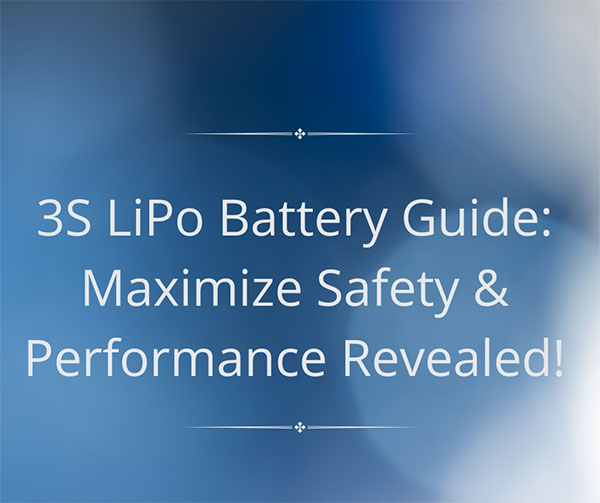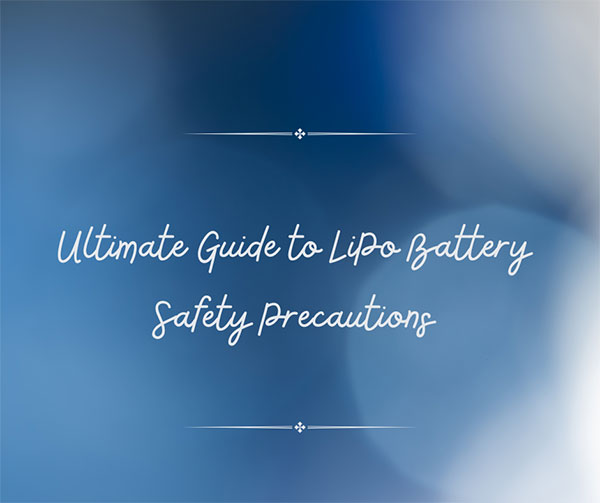Solar Panel
Whether you're traversing the vast oceans, embarking on a cross-country journey, or immersing yourself in the heart of nature, portable solar panels offer you the flexibility to disconnect from the grid on your own terms. Our panels are designed to withstand the rigors of outdoor adventures, ensuring durability, reliability, and easy portability. Harnessing the power of nature, they keep your essential devices charged and at the ready, allowing you to stay connected wherever your adventures take you.

Maximizing Performance and Safety: A Comprehensive Guide to 3S LiPo Batteries
- By 大卫
Ultimate Guide to LiPo Battery Safety Precautions
- By 大卫
5 LiPo Battery Types for Extreme Performance: Power Up Your Devices
- By 大卫
Harness the Power of the Sun: Top-Quality Solar Panels for Sustainable Energy Solutions
Welcome to our premier selection of solar panels, where cutting-edge technology meets sustainable energy solutions. Our solar panels are designed to revolutionize the way you power your home or business, providing efficient and reliable energy while reducing your carbon footprint. With a commitment to quality and innovation, we offer top-of-the-line solar panels that guarantee long-lasting performance and significant savings on your energy bills. Join the green energy revolution today with our state-of-the-art solar panels.
1. High-Efficiency Solar Technology
Experience unparalleled efficiency with our advanced solar panel technology, which maximizes energy production even in low-light conditions. Our panels utilize premium-grade materials and precision engineering to deliver optimal performance, ensuring you get the most out of every ray of sunshine.
2. Durable and Weather-Resistant Construction
Built to withstand the elements, our solar panels feature rugged construction and weather-resistant design. Whether it's scorching heat, heavy rain, or freezing temperatures, our panels are engineered to endure harsh environmental conditions, providing reliable energy production year after year.
3. Seamless Integration and Easy Installation
Simplify your transition to solar energy with our panels' seamless integration and hassle-free installation process. Our team of experts will work with you every step of the way to ensure a smooth and efficient installation, so you can start enjoying the benefits of solar power sooner.
4. Eco-Friendly Energy Solution
Reduce your carbon footprint and contribute to a cleaner, greener planet with our eco-friendly solar panels. By harnessing the power of the sun, you'll not only save money on your energy bills but also do your part in combating climate change and preserving the environment for future generations.
5. Comprehensive Warranty and Support
Rest easy knowing that your investment is protected with our comprehensive warranty and dedicated customer support. We stand behind the quality and reliability of our products, offering peace of mind and confidence in your solar energy system.
FAQ of Solar Panels
Solar panels, also known as photovoltaic (PV) panels, are devices that convert sunlight into electricity. They consist of multiple solar cells made from semiconductor materials such as silicon. When sunlight hits these cells, it creates an electric field that generates direct current (DC) electricity. This electricity is then converted into usable alternating current (AC) electricity through an inverter, which can power electrical loads in homes, businesses, and other applications.
- Solar panels convert sunlight into electricity.
- Made from semiconductor materials like silicon.
- Electricity generated is converted from DC to AC for use.
Solar panels work by utilizing the photovoltaic effect, where sunlight is converted directly into electricity. Each solar cell within a panel is made of layers of semiconductor material, typically silicon. When sunlight strikes these cells, it excites the electrons within the material, creating an electric current. This current flows out of the solar panel as direct current (DC) electricity. An inverter then converts this DC electricity into alternating current (AC), which is the standard form of electricity used in homes and businesses.
- Photovoltaic effect converts sunlight into electricity.
- Solar cells made of semiconductor material like silicon.
- Inverter converts DC electricity into AC electricity.
Solar panels offer numerous benefits, both environmental and economic. Firstly, they provide a renewable and sustainable source of energy, as sunlight is freely available and inexhaustible. By harnessing solar energy, individuals and businesses can reduce their dependence on fossil fuels, thereby decreasing greenhouse gas emissions and combating climate change. Additionally, solar panels can lead to significant cost savings on electricity bills over time, as they allow users to generate their own electricity and potentially even sell excess power back to the grid. Furthermore, installing solar panels can increase the value of a property and contribute to local job creation in the renewable energy sector.
- Renewable and sustainable energy source.
- Reduces dependence on fossil fuels and greenhouse gas emissions.
- Can lead to cost savings on electricity bills and increase property value.
While solar panels offer numerous benefits, there are some potential downsides to consider. One concern is the initial cost of installation, which can be significant despite decreasing prices in recent years. Additionally, solar panels require adequate sunlight to operate efficiently, so their effectiveness may be limited in areas with frequent cloud cover or shading from trees or buildings. Maintenance is another consideration, as solar panels need periodic cleaning to ensure optimal performance, and components may require replacement over time. Finally, the environmental impact of manufacturing and disposing of solar panels, though relatively low compared to fossil fuels, is still a consideration in their lifecycle analysis.
- Initial installation cost can be significant.
- Efficiency limited in areas with poor sunlight exposure.
- Requires periodic maintenance and has environmental impact in manufacturing and disposal.
The lifespan of solar panels can vary depending on factors such as the quality of materials, installation, and maintenance. However, most reputable solar panel manufacturers offer warranties ranging from 20 to 25 years, indicating their confidence in the longevity of their products. With proper care and maintenance, solar panels can continue to generate electricity beyond their warranty period, albeit at slightly reduced efficiency. In general, it is not uncommon for solar panels to last 25 to 30 years or more. As technology advances and manufacturing processes improve, the lifespan of solar panels may increase in the future.
- Warranties typically range from 20 to 25 years.
- Can last 25 to 30 years or more with proper care.
- Lifespan may increase with technological advancements.







